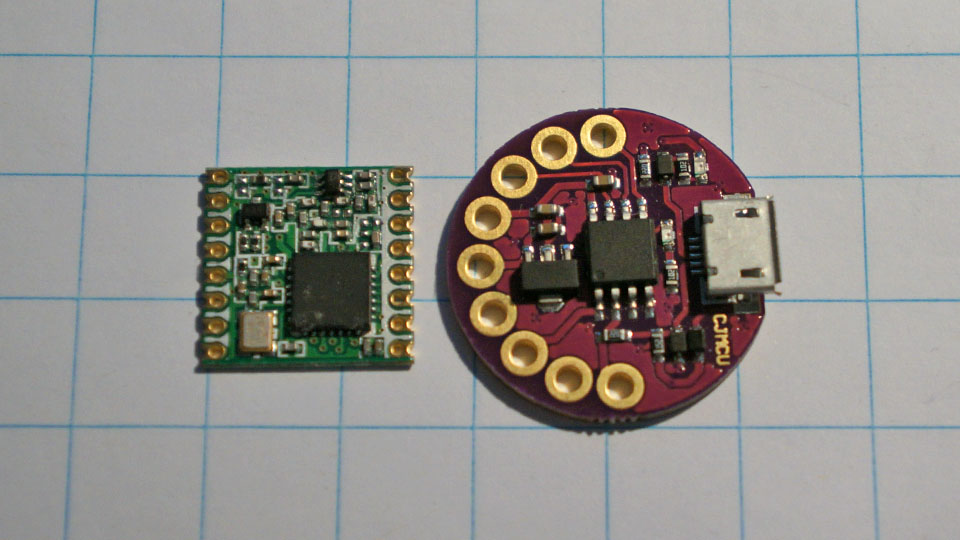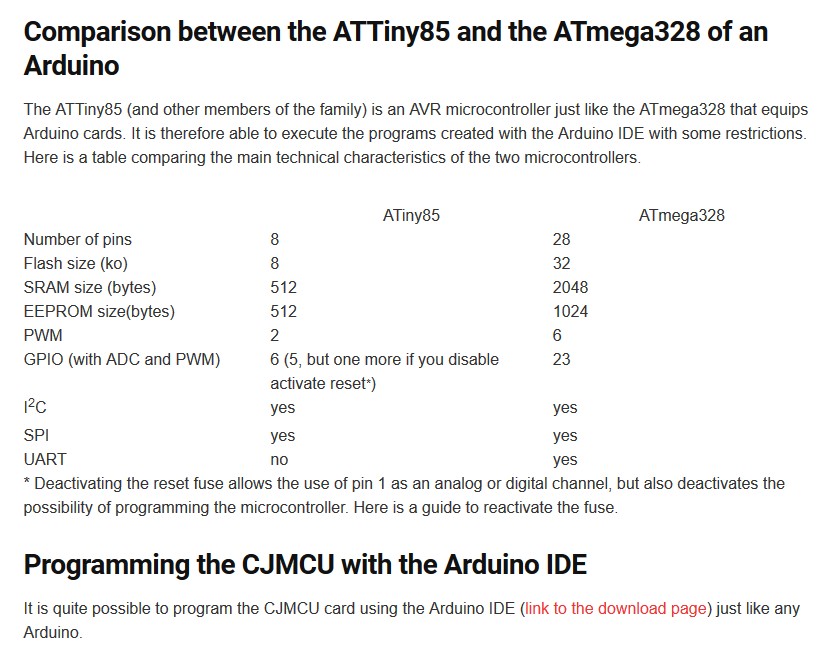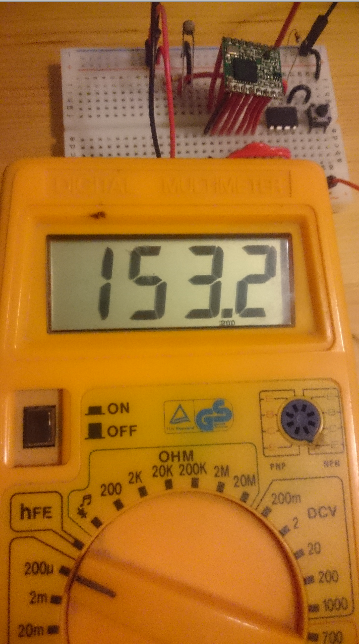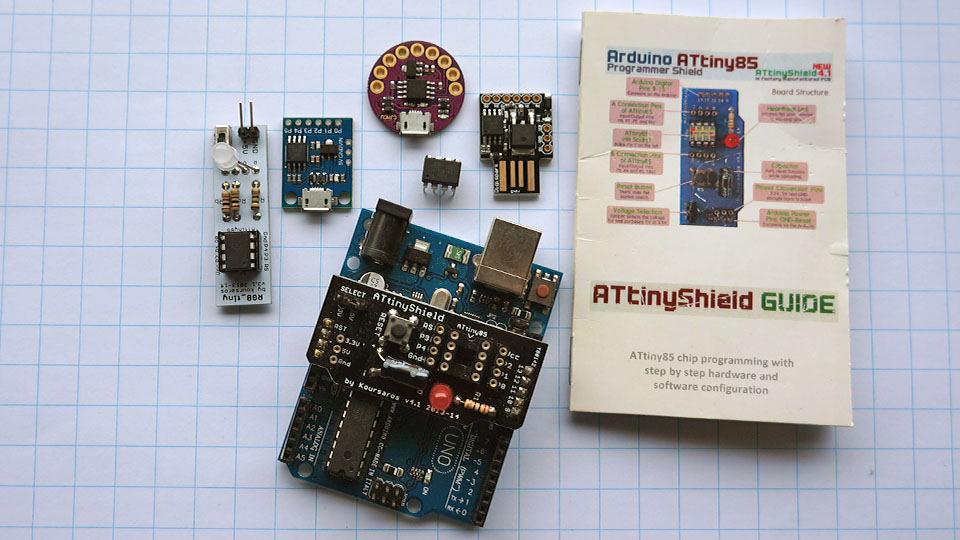This is a quick and dirty sketch of a temperature sensor running on a ATtiny 85.
The ATtiny internally 8Mhz oscilator devided by 8 is used.
Brown-out detection is set to 1.8V.
The node has a fixed datarate and channel frequency, and sends the temperature data every minute
goes to sleep in power down mode and wakes up by the watchdog timer.
I use the LoraWan and AES encryption from Gerben den Hartog
and Arduino tinySPI Library http://github.com/JChristensen/tinySPI
#include <tinySPI.h>
#include <avr/sleep.h>
#include <avr/wdt.h>
#define DIO0 PB3
#define NSS PB0
#define TEMP A2
// the value of resistor
#define SERIESRESISTOR 10000
// resistance at 25 degrees C
#define THERMISTORNOMINAL 10000
// temp. for nominal resistance (almost always 25 C)
#define TEMPERATURENOMINAL 25
// The beta coefficient of the thermistor (usually 3000-4000)
#define BCOEFFICIENT 3950
// how many samples to take and average
#define NUMSAMPLES 5
int samples[NUMSAMPLES];
unsigned int Frame_Counter_Tx = 0x0000;
static const unsigned char PROGMEM S_Table[16][16] = {
{0x63,0x7C,0x77,0x7B,0xF2,0x6B,0x6F,0xC5,0x30,0x01,0x67,0x2B,0xFE,0xD7,0xAB,0x76},
{0xCA,0x82,0xC9,0x7D,0xFA,0x59,0x47,0xF0,0xAD,0xD4,0xA2,0xAF,0x9C,0xA4,0x72,0xC0},
{0xB7,0xFD,0x93,0x26,0x36,0x3F,0xF7,0xCC,0x34,0xA5,0xE5,0xF1,0x71,0xD8,0x31,0x15},
{0x04,0xC7,0x23,0xC3,0x18,0x96,0x05,0x9A,0x07,0x12,0x80,0xE2,0xEB,0x27,0xB2,0x75},
{0x09,0x83,0x2C,0x1A,0x1B,0x6E,0x5A,0xA0,0x52,0x3B,0xD6,0xB3,0x29,0xE3,0x2F,0x84},
{0x53,0xD1,0x00,0xED,0x20,0xFC,0xB1,0x5B,0x6A,0xCB,0xBE,0x39,0x4A,0x4C,0x58,0xCF},
{0xD0,0xEF,0xAA,0xFB,0x43,0x4D,0x33,0x85,0x45,0xF9,0x02,0x7F,0x50,0x3C,0x9F,0xA8},
{0x51,0xA3,0x40,0x8F,0x92,0x9D,0x38,0xF5,0xBC,0xB6,0xDA,0x21,0x10,0xFF,0xF3,0xD2},
{0xCD,0x0C,0x13,0xEC,0x5F,0x97,0x44,0x17,0xC4,0xA7,0x7E,0x3D,0x64,0x5D,0x19,0x73},
{0x60,0x81,0x4F,0xDC,0x22,0x2A,0x90,0x88,0x46,0xEE,0xB8,0x14,0xDE,0x5E,0x0B,0xDB},
{0xE0,0x32,0x3A,0x0A,0x49,0x06,0x24,0x5C,0xC2,0xD3,0xAC,0x62,0x91,0x95,0xE4,0x79},
{0xE7,0xC8,0x37,0x6D,0x8D,0xD5,0x4E,0xA9,0x6C,0x56,0xF4,0xEA,0x65,0x7A,0xAE,0x08},
{0xBA,0x78,0x25,0x2E,0x1C,0xA6,0xB4,0xC6,0xE8,0xDD,0x74,0x1F,0x4B,0xBD,0x8B,0x8A},
{0x70,0x3E,0xB5,0x66,0x48,0x03,0xF6,0x0E,0x61,0x35,0x57,0xB9,0x86,0xC1,0x1D,0x9E},
{0xE1,0xF8,0x98,0x11,0x69,0xD9,0x8E,0x94,0x9B,0x1E,0x87,0xE9,0xCE,0x55,0x28,0xDF},
{0x8C,0xA1,0x89,0x0D,0xBF,0xE6,0x42,0x68,0x41,0x99,0x2D,0x0F,0xB0,0x54,0xBB,0x16}
};
unsigned char NwkSkey[16] = { 0x00, 0x00, 0x00, 0x00, 0x00, 0x00, 0x00, 0x00, 0x00, 0x00, 0x00, 0x00, 0x00, 0x00, 0x00, 0x00 };
unsigned char AppSkey[16] = { 0x00, 0x00, 0x00, 0x00, 0x00, 0x00, 0x00, 0x00, 0x00, 0x00, 0x00, 0x00, 0x00, 0x00, 0x00, 0x00 };
unsigned char DevAddr[4] = { 0x00, 0x00, 0x00, 0x00 };
// sleep cycles
volatile int sleep_count = 0;
const int sleep_total = 8; // 8*8s 64s sleep time
void setup() {
SPI.setDataMode(SPI_MODE0);
SPI.begin();
pinMode(NSS, OUTPUT);
pinMode(DIO0, INPUT);
digitalWrite(NSS, HIGH);
// Turn on the watch dog timer
watchdogOn();
//Initialize RFM module
RFM_Init();
}
void loop() {
goToSleep();
if (sleep_count >= sleep_total) {
uint16_t temp;
uint8_t Data[2];
uint8_t Data_Length = 0x02;
temp = readThermistor() * 100;
Data[0] = (temp >> 8) & 0xff;
Data[1] = temp & 0xff;
LORA_Send_Data(Data, Data_Length, Frame_Counter_Tx);
Frame_Counter_Tx++;
// reset sleep count
sleep_count = 0;
}
}
/*
*****************************************************************************************
* Description : Function contstructs a LoRaWAN package and sends it
*
* Arguments : *Data pointer to the array of data that will be transmitted
* Data_Length nuber of bytes to be transmitted
* Frame_Counter_Up Frame counter of upstream frames
*****************************************************************************************
*/
void LORA_Send_Data(unsigned char *Data, unsigned char Data_Length, unsigned int Frame_Counter_Tx)
{
//Define variables
unsigned char i;
//Direction of frame is up
unsigned char Direction = 0x00;
unsigned char RFM_Data[64];
unsigned char RFM_Package_Length;
unsigned char MIC[4];
//Unconfirmed data up
unsigned char Mac_Header = 0x40;
unsigned char Frame_Control = 0x00;
unsigned char Frame_Port = 0x01;
//Encrypt the data
Encrypt_Payload(Data, Data_Length, Frame_Counter_Tx, Direction);
//Build the Radio Package
RFM_Data[0] = Mac_Header;
RFM_Data[1] = DevAddr[3];
RFM_Data[2] = DevAddr[2];
RFM_Data[3] = DevAddr[1];
RFM_Data[4] = DevAddr[0];
RFM_Data[5] = Frame_Control;
RFM_Data[6] = (Frame_Counter_Tx & 0x00FF);
RFM_Data[7] = ((Frame_Counter_Tx >> 8) & 0x00FF);
RFM_Data[8] = Frame_Port;
//Set Current package length
RFM_Package_Length = 9;
//Load Data
for(i = 0; i < Data_Length; i++)
{
RFM_Data[RFM_Package_Length + i] = Data[i];
}
//Add data Lenth to package length
RFM_Package_Length = RFM_Package_Length + Data_Length;
//Calculate MIC
Calculate_MIC(RFM_Data, MIC, RFM_Package_Length, Frame_Counter_Tx, Direction);
//Load MIC in package
for(i = 0; i < 4; i++)
{
RFM_Data[i + RFM_Package_Length] = MIC[i];
}
//Add MIC length to RFM package length
RFM_Package_Length = RFM_Package_Length + 4;
//Send Package
RFM_Send_Package(RFM_Data, RFM_Package_Length);
}
/*
*****************************************************************************************
* Description : Funtion that writes a register from the RFM
*
* Arguments : RFM_Address Address of register to be written
* RFM_Data Data to be written
*****************************************************************************************
*/
void RFM_Write(unsigned char RFM_Address, unsigned char RFM_Data)
{
//Set NSS pin Low to start communication
digitalWrite(NSS,LOW);
//Send Addres with MSB 1 to make it a writ command
SPI.transfer(RFM_Address | 0x80);
//Send Data
SPI.transfer(RFM_Data);
//Set NSS pin High to end communication
digitalWrite(NSS,HIGH);
}
/*
*****************************************************************************************
* Description: Function used to initialize the RFM module on startup
*****************************************************************************************
*/
void RFM_Init()
{
//Switch RFM to sleep
RFM_Write(0x01,0x00);
//Set RFM in LoRa mode
RFM_Write(0x01,0x80);
//Set RFM in Standby mode wait on mode ready
RFM_Write(0x01,0x81);
/*
while (digitalRead(DIO5) == LOW)
{
}
*/
delay(10);
//Set carrair frequency
// 868.100 MHz / 61.035 Hz = 14222987 = 0xD9068B
RFM_Write(0x06,0xD9);
RFM_Write(0x07,0x06);
RFM_Write(0x08,0x8B);
//PA pin (maximal power)
RFM_Write(0x09,0xFF);
//BW = 125 kHz, Coding rate 4/5, Explicit header mode
RFM_Write(0x1D,0x72);
//Spreading factor 7, PayloadCRC On
RFM_Write(0x1E,0xB4);
//Rx Timeout set to 37 symbols
RFM_Write(0x1F,0x25);
//Preamble length set to 8 symbols
//0x0008 + 4 = 12
RFM_Write(0x20,0x00);
RFM_Write(0x21,0x08);
//Low datarate optimization off AGC auto on
RFM_Write(0x26,0x0C);
//Set LoRa sync word
RFM_Write(0x39,0x34);
//Set IQ to normal values
RFM_Write(0x33,0x27);
RFM_Write(0x3B,0x1D);
//Set FIFO pointers
//TX base adress
RFM_Write(0x0E,0x80);
//Rx base adress
RFM_Write(0x0F,0x00);
//Switch RFM to sleep
RFM_Write(0x01,0x00);
}
/*
*****************************************************************************************
* Description : Function for sending a package with the RFM
*
* Arguments : *RFM_Tx_Package Pointer to arry with data to be send
* Package_Length Length of the package to send
*****************************************************************************************
*/
void RFM_Send_Package(unsigned char *RFM_Tx_Package, unsigned char Package_Length)
{
unsigned char i;
unsigned char RFM_Tx_Location = 0x00;
//Set RFM in Standby mode wait on mode ready
RFM_Write(0x01,0x81);
/*
while (digitalRead(DIO5) == LOW)
{
}
*/
delay(10);
//Switch DIO0 to TxDone
RFM_Write(0x40,0x40);
//Set carrier frequency
// 868.100 MHz / 61.035 Hz = 14222987 = 0xD9068B
RFM_Write(0x06,0xD9);
RFM_Write(0x07,0x06);
RFM_Write(0x08,0x8B);
//SF7 BW 125 kHz
RFM_Write(0x1E,0x74); //SF7 CRC On
RFM_Write(0x1D,0x72); //125 kHz 4/5 coding rate explicit header mode
RFM_Write(0x26,0x04); //Low datarate optimization off AGC auto on
//Set IQ to normal values
RFM_Write(0x33,0x27);
RFM_Write(0x3B,0x1D);
//Set payload length to the right length
RFM_Write(0x22,Package_Length);
//Get location of Tx part of FiFo
//RFM_Tx_Location = RFM_Read(0x0E);
//Set SPI pointer to start of Tx part in FiFo
//RFM_Write(0x0D,RFM_Tx_Location);
RFM_Write(0x0D,0x80); // hardcoded fifo location according RFM95 specs
//Write Payload to FiFo
for (i = 0;i < Package_Length; i++)
{
RFM_Write(0x00,*RFM_Tx_Package);
RFM_Tx_Package++;
}
//Switch RFM to Tx
RFM_Write(0x01,0x83);
//Wait for TxDone
while(digitalRead(DIO0) == LOW)
{
}
//Switch RFM to sleep
RFM_Write(0x01,0x00);
}
void Encrypt_Payload(unsigned char *Data, unsigned char Data_Length, unsigned int Frame_Counter, unsigned char Direction)
{
unsigned char i = 0x00;
unsigned char j;
unsigned char Number_of_Blocks = 0x00;
unsigned char Incomplete_Block_Size = 0x00;
unsigned char Block_A[16];
//Calculate number of blocks
Number_of_Blocks = Data_Length / 16;
Incomplete_Block_Size = Data_Length % 16;
if(Incomplete_Block_Size != 0)
{
Number_of_Blocks++;
}
for(i = 1; i <= Number_of_Blocks; i++)
{
Block_A[0] = 0x01;
Block_A[1] = 0x00;
Block_A[2] = 0x00;
Block_A[3] = 0x00;
Block_A[4] = 0x00;
Block_A[5] = Direction;
Block_A[6] = DevAddr[3];
Block_A[7] = DevAddr[2];
Block_A[8] = DevAddr[1];
Block_A[9] = DevAddr[0];
Block_A[10] = (Frame_Counter & 0x00FF);
Block_A[11] = ((Frame_Counter >> 8) & 0x00FF);
Block_A[12] = 0x00; //Frame counter upper Bytes
Block_A[13] = 0x00;
Block_A[14] = 0x00;
Block_A[15] = i;
//Calculate S
AES_Encrypt(Block_A,AppSkey); //original
//Check for last block
if(i != Number_of_Blocks)
{
for(j = 0; j < 16; j++)
{
*Data = *Data ^ Block_A[j];
Data++;
}
}
else
{
if(Incomplete_Block_Size == 0)
{
Incomplete_Block_Size = 16;
}
for(j = 0; j < Incomplete_Block_Size; j++)
{
*Data = *Data ^ Block_A[j];
Data++;
}
}
}
}
void Calculate_MIC(unsigned char *Data, unsigned char *Final_MIC, unsigned char Data_Length, unsigned int Frame_Counter, unsigned char Direction)
{
unsigned char i;
unsigned char Block_B[16];
unsigned char Key_K1[16] = {
0x00, 0x00, 0x00, 0x00, 0x00, 0x00, 0x00, 0x00,
0x00, 0x00, 0x00, 0x00, 0x00, 0x00, 0x00, 0x00
};
unsigned char Key_K2[16] = {
0x00, 0x00, 0x00, 0x00, 0x00, 0x00, 0x00, 0x00,
0x00, 0x00, 0x00, 0x00, 0x00, 0x00, 0x00, 0x00
};
//unsigned char Data_Copy[16];
unsigned char Old_Data[16] = {
0x00, 0x00, 0x00, 0x00, 0x00, 0x00, 0x00, 0x00,
0x00, 0x00, 0x00, 0x00, 0x00, 0x00, 0x00, 0x00
};
unsigned char New_Data[16] = {
0x00, 0x00, 0x00, 0x00, 0x00, 0x00, 0x00, 0x00,
0x00, 0x00, 0x00, 0x00, 0x00, 0x00, 0x00, 0x00
};
unsigned char Number_of_Blocks = 0x00;
unsigned char Incomplete_Block_Size = 0x00;
unsigned char Block_Counter = 0x01;
//Create Block_B
Block_B[0] = 0x49;
Block_B[1] = 0x00;
Block_B[2] = 0x00;
Block_B[3] = 0x00;
Block_B[4] = 0x00;
Block_B[5] = Direction;
Block_B[6] = DevAddr[3];
Block_B[7] = DevAddr[2];
Block_B[8] = DevAddr[1];
Block_B[9] = DevAddr[0];
Block_B[10] = (Frame_Counter & 0x00FF);
Block_B[11] = ((Frame_Counter >> 8) & 0x00FF);
Block_B[12] = 0x00; //Frame counter upper bytes
Block_B[13] = 0x00;
Block_B[14] = 0x00;
Block_B[15] = Data_Length;
//Calculate number of Blocks and blocksize of last block
Number_of_Blocks = Data_Length / 16;
Incomplete_Block_Size = Data_Length % 16;
if(Incomplete_Block_Size != 0)
{
Number_of_Blocks++;
}
Generate_Keys(Key_K1, Key_K2);
//Preform Calculation on Block B0
//Preform AES encryption
AES_Encrypt(Block_B,NwkSkey);
//Copy Block_B to Old_Data
for(i = 0; i < 16; i++)
{
Old_Data[i] = Block_B[i];
}
//Preform full calculating until n-1 messsage blocks
while(Block_Counter < Number_of_Blocks)
{
//Copy data into array
for(i = 0; i < 16; i++)
{
New_Data[i] = *Data;
Data++;
}
//Preform XOR with old data
XOR(New_Data,Old_Data);
//Preform AES encryption
AES_Encrypt(New_Data,NwkSkey);
//Copy New_Data to Old_Data
for(i = 0; i < 16; i++)
{
Old_Data[i] = New_Data[i];
}
//Raise Block counter
Block_Counter++;
}
//Perform calculation on last block
//Check if Datalength is a multiple of 16
if(Incomplete_Block_Size == 0)
{
//Copy last data into array
for(i = 0; i < 16; i++)
{
New_Data[i] = *Data;
Data++;
}
//Preform XOR with Key 1
XOR(New_Data,Key_K1);
//Preform XOR with old data
XOR(New_Data,Old_Data);
//Preform last AES routine
// read NwkSkey from PROGMEM
AES_Encrypt(New_Data,NwkSkey);
}
else
{
//Copy the remaining data and fill the rest
for(i = 0; i < 16; i++)
{
if(i < Incomplete_Block_Size)
{
New_Data[i] = *Data;
Data++;
}
if(i == Incomplete_Block_Size)
{
New_Data[i] = 0x80;
}
if(i > Incomplete_Block_Size)
{
New_Data[i] = 0x00;
}
}
//Preform XOR with Key 2
XOR(New_Data,Key_K2);
//Preform XOR with Old data
XOR(New_Data,Old_Data);
//Preform last AES routine
AES_Encrypt(New_Data,NwkSkey);
}
Final_MIC[0] = New_Data[0];
Final_MIC[1] = New_Data[1];
Final_MIC[2] = New_Data[2];
Final_MIC[3] = New_Data[3];
}
void Generate_Keys(unsigned char *K1, unsigned char *K2)
{
unsigned char i;
unsigned char MSB_Key;
//Encrypt the zeros in K1 with the NwkSkey
AES_Encrypt(K1,NwkSkey);
//Create K1
//Check if MSB is 1
if((K1[0] & 0x80) == 0x80)
{
MSB_Key = 1;
}
else
{
MSB_Key = 0;
}
//Shift K1 one bit left
Shift_Left(K1);
//if MSB was 1
if(MSB_Key == 1)
{
K1[15] = K1[15] ^ 0x87;
}
//Copy K1 to K2
for( i = 0; i < 16; i++)
{
K2[i] = K1[i];
}
//Check if MSB is 1
if((K2[0] & 0x80) == 0x80)
{
MSB_Key = 1;
}
else
{
MSB_Key = 0;
}
//Shift K2 one bit left
Shift_Left(K2);
//Check if MSB was 1
if(MSB_Key == 1)
{
K2[15] = K2[15] ^ 0x87;
}
}
void Shift_Left(unsigned char *Data)
{
unsigned char i;
unsigned char Overflow = 0;
//unsigned char High_Byte, Low_Byte;
for(i = 0; i < 16; i++)
{
//Check for overflow on next byte except for the last byte
if(i < 15)
{
//Check if upper bit is one
if((Data[i+1] & 0x80) == 0x80)
{
Overflow = 1;
}
else
{
Overflow = 0;
}
}
else
{
Overflow = 0;
}
//Shift one left
Data[i] = (Data[i] << 1) + Overflow;
}
}
void XOR(unsigned char *New_Data,unsigned char *Old_Data)
{
unsigned char i;
for(i = 0; i < 16; i++)
{
New_Data[i] = New_Data[i] ^ Old_Data[i];
}
}
/*
*****************************************************************************************
* Title : AES_Encrypt
* Description :
*****************************************************************************************
*/
void AES_Encrypt(unsigned char *Data, unsigned char *Key)
{
unsigned char Row, Column, Round = 0;
unsigned char Round_Key[16];
unsigned char State[4][4];
// Copy input to State arry
for( Column = 0; Column < 4; Column++ )
{
for( Row = 0; Row < 4; Row++ )
{
State[Row][Column] = Data[Row + (Column << 2)];
}
}
// Copy key to round key
memcpy( &Round_Key[0], &Key[0], 16 );
// Add round key
AES_Add_Round_Key( Round_Key, State );
// Preform 9 full rounds with mixed collums
for( Round = 1 ; Round < 10 ; Round++ )
{
// Perform Byte substitution with S table
for( Column = 0 ; Column < 4 ; Column++ )
{
for( Row = 0 ; Row < 4 ; Row++ )
{
State[Row][Column] = AES_Sub_Byte( State[Row][Column] );
}
}
// Perform Row Shift
AES_Shift_Rows(State);
// Mix Collums
AES_Mix_Collums(State);
// Calculate new round key
AES_Calculate_Round_Key(Round, Round_Key);
// Add the round key to the Round_key
AES_Add_Round_Key(Round_Key, State);
}
// Perform Byte substitution with S table whitout mix collums
for( Column = 0 ; Column < 4 ; Column++ )
{
for( Row = 0; Row < 4; Row++ )
{
State[Row][Column] = AES_Sub_Byte(State[Row][Column]);
}
}
// Shift rows
AES_Shift_Rows(State);
// Calculate new round key
AES_Calculate_Round_Key( Round, Round_Key );
// Add round key
AES_Add_Round_Key( Round_Key, State );
// Copy the State into the data array
for( Column = 0; Column < 4; Column++ )
{
for( Row = 0; Row < 4; Row++ )
{
Data[Row + (Column << 2)] = State[Row][Column];
}
}
} // AES_Encrypt
/*
*****************************************************************************************
* Title : AES_Add_Round_Key
* Description :
*****************************************************************************************
*/
void AES_Add_Round_Key(unsigned char *Round_Key, unsigned char (*State)[4])
{
unsigned char Row, Collum;
for(Collum = 0; Collum < 4; Collum++)
{
for(Row = 0; Row < 4; Row++)
{
State[Row][Collum] ^= Round_Key[Row + (Collum << 2)];
}
}
} // AES_Add_Round_Key
/*
*****************************************************************************************
* Title : AES_Sub_Byte
* Description :
*****************************************************************************************
*/
unsigned char AES_Sub_Byte(unsigned char Byte)
{
// unsigned char S_Row,S_Collum;
// unsigned char S_Byte;
//
// S_Row = ((Byte >> 4) & 0x0F);
// S_Collum = ((Byte >> 0) & 0x0F);
// S_Byte = S_Table [S_Row][S_Collum];
//return S_Table [ ((Byte >> 4) & 0x0F) ] [ ((Byte >> 0) & 0x0F) ]; // original
return pgm_read_byte(&(S_Table [((Byte >> 4) & 0x0F)] [((Byte >> 0) & 0x0F)]));
} // AES_Sub_Byte
/*
*****************************************************************************************
* Title : AES_Shift_Rows
* Description :
*****************************************************************************************
*/
void AES_Shift_Rows(unsigned char (*State)[4])
{
unsigned char Buffer;
//Store firt byte in buffer
Buffer = State[1][0];
//Shift all bytes
State[1][0] = State[1][1];
State[1][1] = State[1][2];
State[1][2] = State[1][3];
State[1][3] = Buffer;
Buffer = State[2][0];
State[2][0] = State[2][2];
State[2][2] = Buffer;
Buffer = State[2][1];
State[2][1] = State[2][3];
State[2][3] = Buffer;
Buffer = State[3][3];
State[3][3] = State[3][2];
State[3][2] = State[3][1];
State[3][1] = State[3][0];
State[3][0] = Buffer;
} // AES_Shift_Rows
/*
*****************************************************************************************
* Title : AES_Mix_Collums
* Description :
*****************************************************************************************
*/
void AES_Mix_Collums(unsigned char (*State)[4])
{
unsigned char Row,Collum;
unsigned char a[4], b[4];
for(Collum = 0; Collum < 4; Collum++)
{
for(Row = 0; Row < 4; Row++)
{
a[Row] = State[Row][Collum];
b[Row] = (State[Row][Collum] << 1);
if((State[Row][Collum] & 0x80) == 0x80)
{
b[Row] ^= 0x1B;
}
}
State[0][Collum] = b[0] ^ a[1] ^ b[1] ^ a[2] ^ a[3];
State[1][Collum] = a[0] ^ b[1] ^ a[2] ^ b[2] ^ a[3];
State[2][Collum] = a[0] ^ a[1] ^ b[2] ^ a[3] ^ b[3];
State[3][Collum] = a[0] ^ b[0] ^ a[1] ^ a[2] ^ b[3];
}
} // AES_Mix_Collums
/*
*****************************************************************************************
* Title : AES_Calculate_Round_Key
* Description :
*****************************************************************************************
*/
void AES_Calculate_Round_Key(unsigned char Round, unsigned char *Round_Key)
{
unsigned char i, j, b, Rcon;
unsigned char Temp[4];
//Calculate Rcon
Rcon = 0x01;
while(Round != 1)
{
b = Rcon & 0x80;
Rcon = Rcon << 1;
if(b == 0x80)
{
Rcon ^= 0x1b;
}
Round--;
}
// Calculate first Temp
// Copy laste byte from previous key and subsitute the byte, but shift the array contents around by 1.
Temp[0] = AES_Sub_Byte( Round_Key[12 + 1] );
Temp[1] = AES_Sub_Byte( Round_Key[12 + 2] );
Temp[2] = AES_Sub_Byte( Round_Key[12 + 3] );
Temp[3] = AES_Sub_Byte( Round_Key[12 + 0] );
// XOR with Rcon
Temp[0] ^= Rcon;
// Calculate new key
for(i = 0; i < 4; i++)
{
for(j = 0; j < 4; j++)
{
Round_Key[j + (i << 2)] ^= Temp[j];
Temp[j] = Round_Key[j + (i << 2)];
}
}
} // AES_Calculate_Round_Key
float readThermistor() {
uint8_t i;
float average;
float temp;
// take N samples in a row, with a slight delay
for (i=0; i< NUMSAMPLES; i++) {
samples[i] = analogRead(TEMP);
delay(10);
}
// average all the samples out
average = 0;
for (i=0; i< NUMSAMPLES; i++) {
average += samples[i];
}
average /= NUMSAMPLES;
// convert the value to resistance
average = 1023 / average - 1;
average = SERIESRESISTOR / average;
temp = average / THERMISTORNOMINAL;
temp = log(temp);
temp /= BCOEFFICIENT;
temp += 1.0 / (TEMPERATURENOMINAL + 273.15);
temp = 1.0 / temp;
temp -= 273.15;
return temp;
}
void watchdogOn() {
// clear various "reset" flags
MCUSR = 0;
// allow changes, disable reset
WDTCR = (1 << WDCE) | (1 << WDE);
// set interrupt mode and an interval
WDTCR = (1 << WDIE) | (1 << WDP3) | (1 << WDP0); // set WDIE, and 8 seconds delay
wdt_reset(); // pat the dog
}
void goToSleep() {
set_sleep_mode(SLEEP_MODE_PWR_DOWN); // Set sleep mode.
noInterrupts (); // timed sequence follows
sleep_enable();
interrupts (); // guarantees next instruction executed
sleep_cpu(); // Enter sleep mode.
// After waking from watchdog interrupt the code continues from this point.
sleep_disable(); // Disable sleep mode after waking.
}
ISR(WDT_vect) {
sleep_count++; // keep track of how many sleep cycles have been completed.
}i hope it can be useful for somebody 









